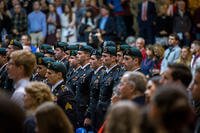Throughout history, the United States has seen its share of battles. Most were waged on foreign shores, and some, here at home. The battle of segregation and racism, however, is alive today as it was forty years ago, as it was one hundred years before that. Recently, I had the opportunity to hear a recording of the speech of Rev. Martin Luther King, Jr. from the steps of the Lincoln Memorial in 1963. The day would become legendary; the man, a symbol of freedom and the price paid, and the words of Rev. King's speech would resonate through history:
"The marvelous new militancy which has engulfed the Negro community must not lead us to distrust of all white people, for many of our white brothers, as evidenced by their presence here today, have come to realize that their destiny is tied up with our destiny and their freedom is inextricably bound to our freedom."
On the steps of the Lincoln memorial, Rev. King spoke of an "inextricably bound freedom." That freedom was demonstrated one hundred years prior as a result of President Abraham Lincoln's Emancipation Proclamation. The signing of the Proclamation paved the way for the 54th infantry, which was formed out of Massachusetts by Colonel Robert Gould Shaw, and consisted of an all-Negro contingent, a first of its kind, which included as recruits the sons of Abolitionist Frederick Douglass. Although it was said by many that blacks wouldn't fight, black soldiers went on to be awarded sixteen Medals of Honor by the end of the Civil War, including the first Medal of Honor to be awarded an African American, William H. Carney of the 54th Infantry. His response to his actions in battle: "I was just doing my duty." His duty spoke volumes to blacks and whites alike. Young black men continued for the next hundred years to exemplify themselves in battle as demonstrated by the Buffalo Soldiers, and the Tuskegee Airmen of World War II. Although blacks have fought alongside whites throughout history in every U.S. war, the fight for integration lasted for over 100 years, and on some levels, still continues today. It can be seen on the mess deck onboard ship, or within the ranks of any platoon. It transcends service, rate and rank, and rots the very core of the liberties and freedoms we as soldiers fight to protect.
The soldiers who gave their lives for the freedom we as Americans enjoy today, undoubtedly saw no color on the battlefield. Their ghosts live on in our great memorials on the Mall in Washington. There is no color to the Vietnam Memorial, or to the WWII Memorial. No color adorns the soldiers of the Korean War memorial or the memorial of Iwo Jima. These ghosts saw only the soldiers they fought with, and heard only the common call of duty. They were bound together by their destiny, and inextricably bound by their fight for freedom. The same freedom Rev. King spoke of.
Standing on the Mall in Washington D.C., Rev. King went on to say:
"I have a dream that my four children will one day live in a nation where they will not be judged by the color of their skin but by the content of their character."
Those ghosts of the past, they too shared that dream; as do I.















